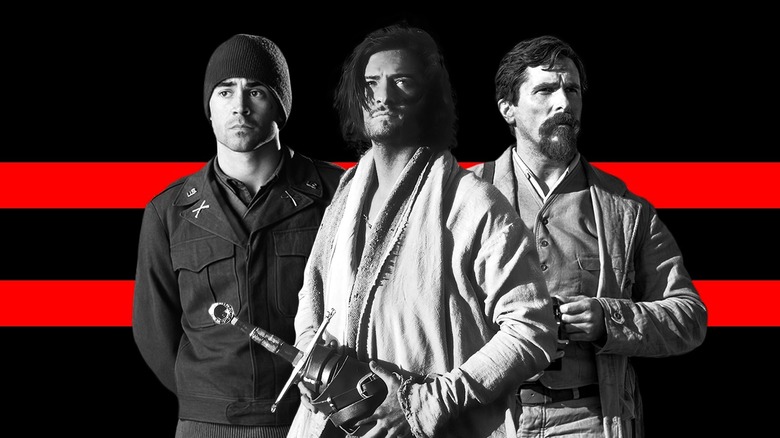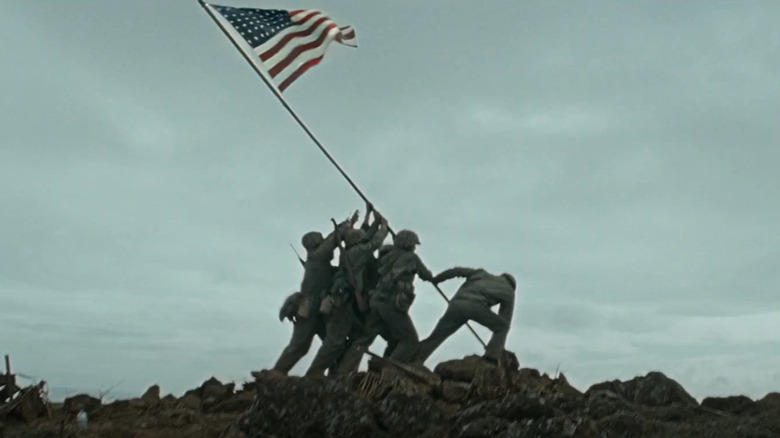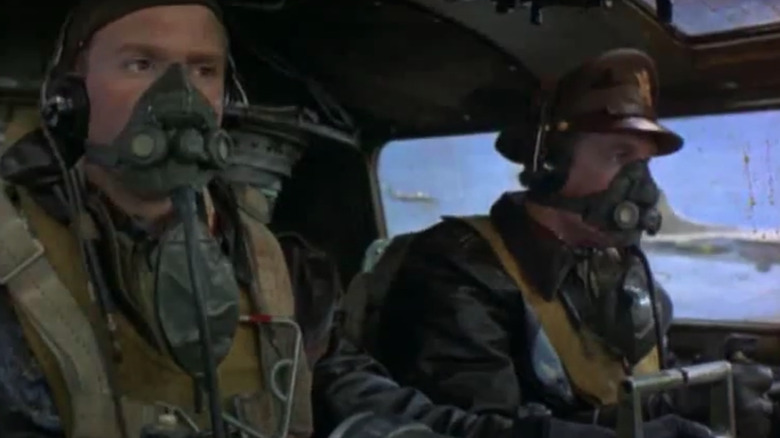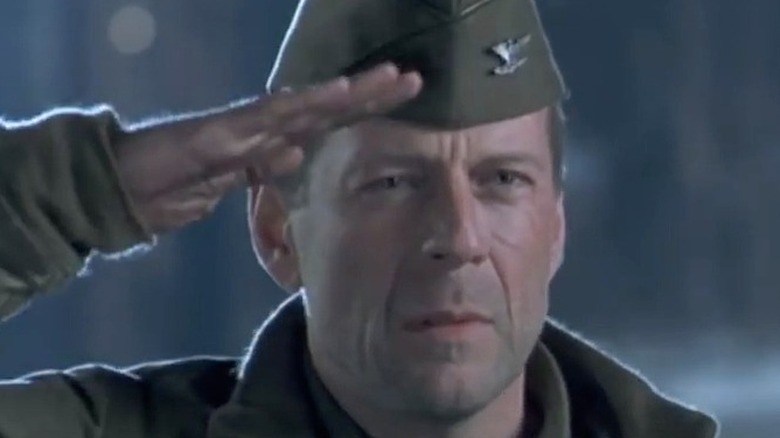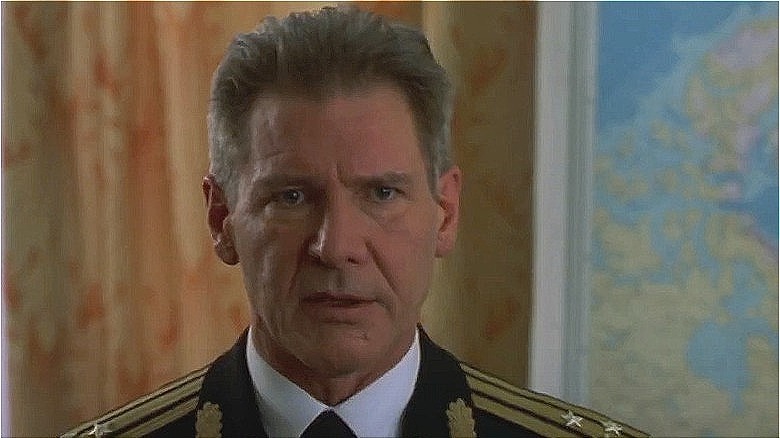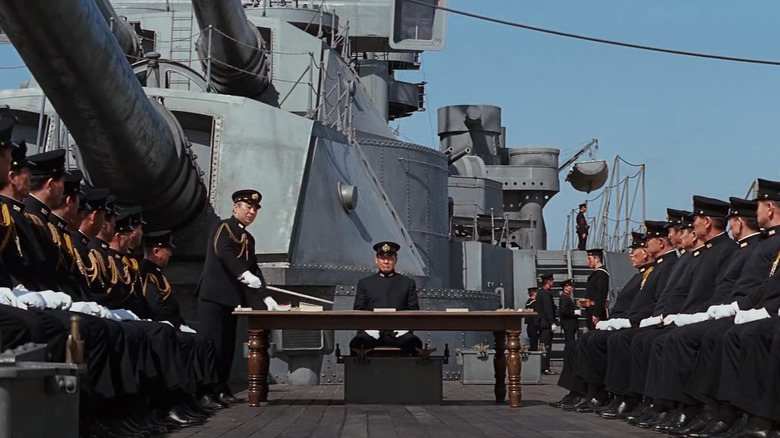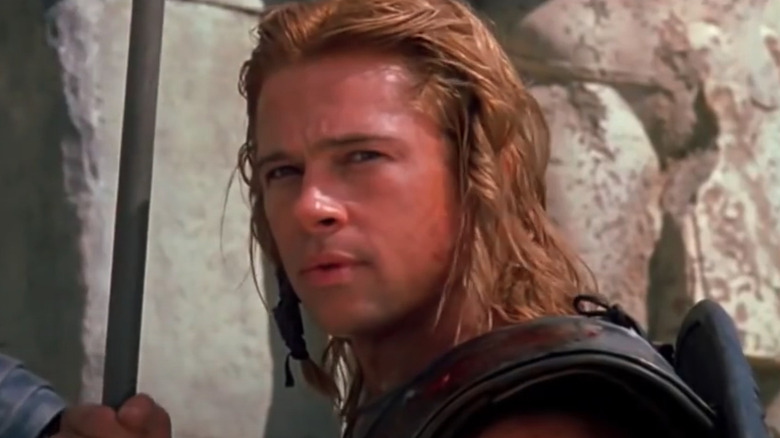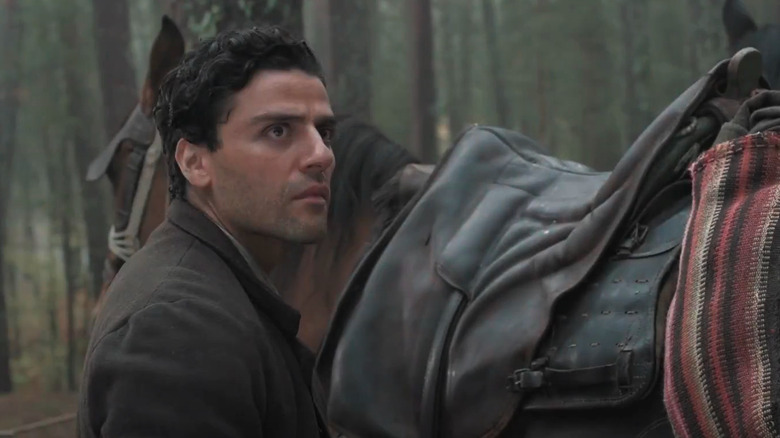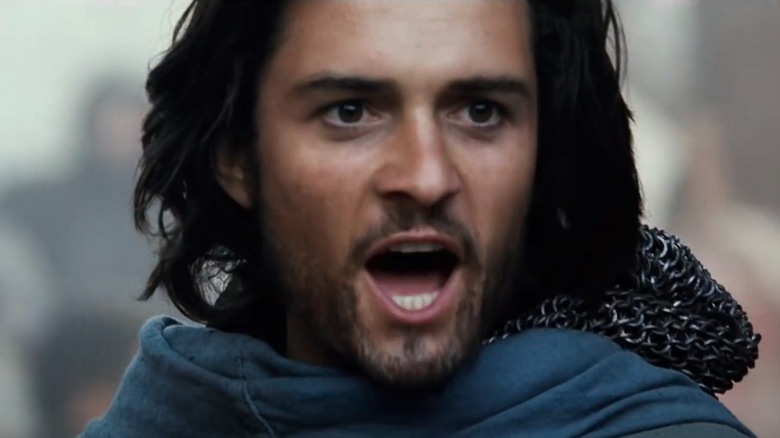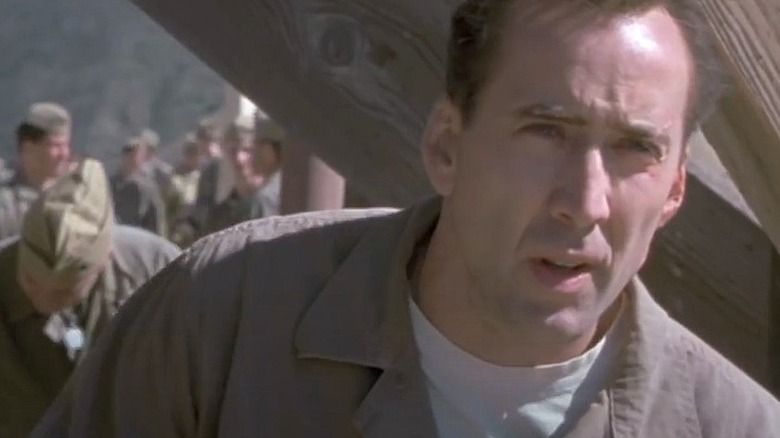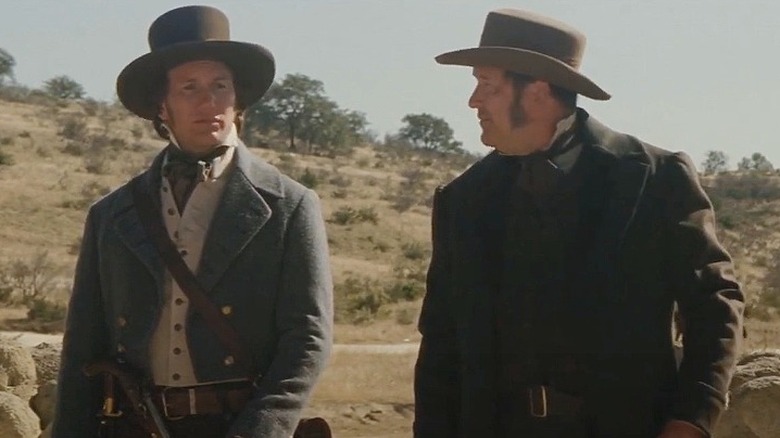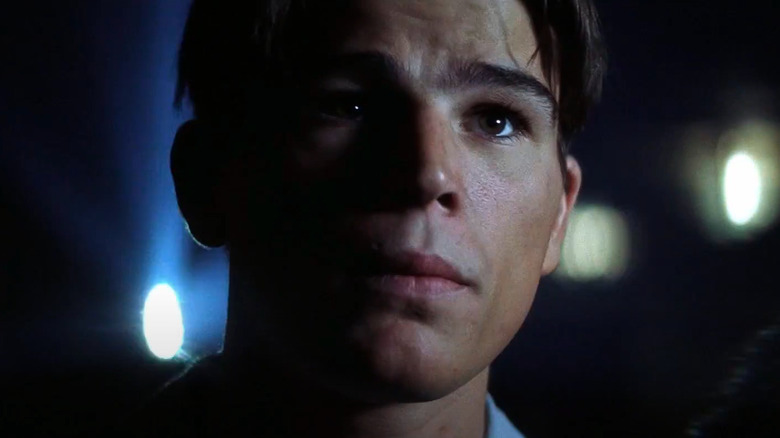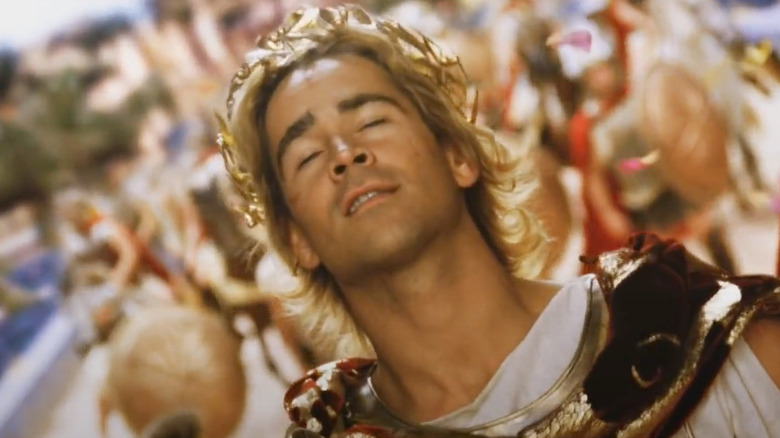Critically-Panned War Movies That You Should Give A Chance
Who doesn't love a good war movie — the romance, the spectacle, the exhilaration, the drama, the heartbreak? Well, as it turns out, most critics seem to hate a majority of war films and save their positive reviews for a select few, such as "Apocalypse Now," "Full Metal Jacket," and "Saving Private Ryan." Granted, the genre has produced some real stinkers over the years, but plenty of war epics also endured unwarranted critical disdain; many of these pictures provided rock-solid entertainment but were labeled cliché, sentimental, or too noble for their own good.
Imagine calling a film set in World War II too earnest or berating a romantic epic for its love story.
Look, I'm just as enamored with and respectful of a critic's opinion as the next person, but we can all agree they get it wrong sometimes. As proof, I've compiled a list of war epics I believe were unjustly criticized at the time of their release, all of which deserve a second chance to prove their worth in the eyes of moviegoers.
So here's my list — in no particular order. Let's do this!
Flags of Our Fathers
In 2006, director Clint Eastwood released the one-two punch of "Flags of Our Fathers" and "Letters from Iwo Jima," which depicted the Battle of Iwo Jima from the perspectives of the American and Japanese soldiers who took part in the violent conflict. While the latter received rave reviews and a handful of Academy Award nominations, "Flags of Our Fathers" failed to register much with critics or audiences.
"'Flags of Our Fathers' is as painstaking as a documentary but without the satisfaction of a documentary or the impact of a drama," wrote The San Francisco Chronicle's Mike LaSalle. Oddly enough, other critics, such as Ed Gonzalez of House Next Door, felt the film was exploitative and leaned on "easy sentimentality."
For me, "Flags of Our Fathers" is a fascinating deconstruction of the war myth. Far too often, we view World War II as a black-and-white tale of heroes and villains. In reality, history has proven far more nuanced and complex. As Eastwood, and by extension authors James Bradley and Ron Powers, whose novel served as the basis for the drama, explains with his film, the soldiers who fought in WWII were regular boys stuck in a conflict they didn't fully understand. While other pictures may have tackled this subject better, there's no denying Eastwood strikes a powerful chord, resulting in a surprisingly intimate war picture that deserves far more credit than it receives.
Memphis Belle
Few movies capture the horrors of the WWII Flying Fortresses with such commercial zeal as Michael Caton-Jones' star-studded "Memphis Belle." While only loosely based on actual events, the 1990 war picture nonetheless gets the job done — sometimes with stunning results — and offers a harrowing depiction of life inside a B-17 during combat. Heck, the young, handsome cast alone is worth the price of admission: Matthew Modine, Eric Stoltz, Sean Astin, Harry Connick Jr., Tate Donovan, John Lithgow, Billy Zane, and D.B. Sweeney. That's an all-star lineup right there!
Nevertheless, most critics gave the film a thumbs down, including Gene Siskel, who, on the TV show "Siskel & Ebert," praised the action sequences but felt the cast lacked charisma and argued that some of the direction made the picture feel like a TV production.
"Memphis Belle" was one of my early introductions to war movies. As a kid, I found the action spectacular and bonded with the motley crew during their harrowing adventure. While I admit the film hasn't aged well, I still admire its no-frills approach to its subject matter and respect for the craft. The relatively brief runtime doesn't afford much character development, but each cast member gets an opportunity to leave a mark in unique ways — tomato soup, anyone? At one point, a gunner shoots an enemy aircraft and then watches in horror as it nosedives into an allied bomber. That scene has stuck with me for ages! Sorry, Gene, you were wrong about this one.
Hart's War
More courtroom drama than an out-and-out war film, "Hart's War" features plenty of intense combat as witnessed by the prisoners of a German stalag during WWII. The story revolves around the trial of a black man (Terrence Howard) accused of killing a fellow soldier. The titular Hart (Colin Farrell), at the behest of Colonel William McNamara (Bruce Willis), must step in and offer support for the accused while dealing with racism, evil Germans, and dangerous secrets.
Many critics chastised "Hart's War" for its earnestness and ho-hum theatrics. "We're situated in that familiar showbiz intersection of Hollywood and Rhine," wrote New York Magazine/Vulture's Peter Rainer. "More or less self-destructs in a ridiculous last few minutes when it becomes a noble sacrifice-o-rama," claimed the Washington Post's Stephen Hunter.
"Hart's War" does overstay its welcome by a good 15 minutes and occasionally loses sight of its overall purpose. Still, the picture always holds our attention thanks to an intelligent script by Billy Ray, Terry George, and John Katzenbach, and solid performances from its leads. What might have been Hollywood hokum in lesser hands turns into a noble tale of sacrifice, camaraderie, and friendship that's not too afraid to tackle complex social issues head-on. Critics can turn up their noses, but "Hart's War" delivers better than most in the genre.
K19: The Widowmaker
At first glance, Kathryn Bigelow's "K-19: The Widowmaker" appears to be a rudimentary submarine thriller with the type of underwater suspense typically reserved for pictures in the sub-genre (pun intended). "Though this saga would be terrific to read about, it is dicey screen material that only a genius should touch," noted USA Today's Mike Clark. Fair enough. "K-19" never fully lives up to its harrowing true story, and yes, at times, stars Harrison Ford and Liam Neeson are occasionally "dopey" in accent-ridden performances, as noted by the Observer's Rex Reed.
On repeat viewings, however, if one can get past Ford's sketchy Russian accent, moviegoers will find an exciting character drama packed with enough tension to keep them riveted from start to finish. If you like Bigelow's other character-driven war epics, namely the Academy Award-winning "The Hurt Locker" and "Zero Dark Thirty," you'll probably dig "K-19."
Indeed, I agree with Peter Travers, who complimented the film and praised its director. "A salute is in order for Bigelow, a director who knows how to navigate macho terrain without losing her human compass." He gets it — too bad other critics weren't as discerning.
Tora! Tora! Tora!
War films are tricky to pull off successfully. Over-embellish, and a director may get blasted for capitalizing on a true-life event/tragedy. Play it too straight, and critics will knock the lack of cinematic magic. In the case of 1970's "Tora! Tora! Tora!," the filmmakers opted to hew closer to fact and dutifully recreated the Japanese attack on Pearl Harbor in excruciating detail. Unfortunately, this isn't so much a film as a documentary with Hollywood stars portraying historical figures.
Some critics praised this approach, while others, such as Empire Online's Clark Collis, were far more negative. "This big-budget, noble-but-dull account of the run up to Pearl Harbor is high on historical veracity but low on drama," he wrote in his review. Even Roger Ebert (who likewise detested Michael Bay's "Pearl Harbor") was unable to find many qualities in "Tora! Tora! Tora!" and wrote it off as a bland blockbuster.
I found the realistic approach fascinating. Here we have an epic drama that operates from within military offices where no-nonsense leaders struggled to deduce Japan's point of attack. We learn that the attack on Pearl Harbor was a complicated affair resulting from a bad mix of incompetence and naïveté. "Tora! Tora! Tora!" gives us the details, and while the results may not be cinematic, the film is always insightful — especially if you're a history buff.
Troy
Following the release of Ridley Scott's Academy Award-winning "Gladiator" in 2000, movie studios scrambled to capitalize on the suddenly revitalized sword-and-sandals epic. Out of all the knockoffs and imitators, director Wolfgang Peterson comes closest to matching Scott's visceral power with 2004's "Troy," which adapts Homer's poem, "The Iliad," albeit in a grounded fashion.
The star-studded affair features Brad Pitt, Eric Bana, Orlando Bloom, Diane Kruger, Brian Cox, and Sean Bean, an abundance of exciting action sequences, romance, and plenty of drama. No matter, critics mostly turned up their noses. Jessica Winter of Time Out called the picture "A numbingly reliable tick-tock of expository set pieces alternating with vast CGI-aided battle scenes." Similarly, New York Magazine/Vulture's Peter Rainer labeled the epic "fairly routine."
"Troy" doesn't win any awards for subtlety, but there is plenty to admire here from Pitt's larger-than-life depiction of Achilles, who enjoys a fleeting romance with Rose Byrne; Bana's soulful performance as Hector; and the various mano-a-mano smackdowns sprinkled across the narrative — Achille v Hector is a personal favorite. "Troy" earns its R rating with ample sex, nudity, and gore, making it the perfect flick for older couples on date night. Peterson's drama gets the job done.
And hey, if the theatrical cut doesn't float your boat, check out the extended Director's Cut that further fleshes out the drama.
The Promise
"The Promise" is one of the more curious entries on this list. Why? Because it's actually really good, but somehow forgotten. I shied away from Terry George's sprawling romantic epic when it hit theaters in 2017, primarily due to negative reviews and deprived myself of a truly remarkable cinematic experience. Who can fault me? Why would anyone see a movie Peter Travers slammed for featuring "a soapy, invented love triangle?" Or one blasted by the Los Angeles Times' Katie Walsh, who wrote, "With seemingly all the right pieces, it's a disappointment that 'The Promise' lacks the energy and originality needed to sustain itself."
Watching it years after its cataclysmic failure in theaters, I found myself swept up in the tragic romance enacted by stars Oscar Isaac, Charlotte Le Bon, and Christian Bale. I appreciated the old-fashioned approach to the material. As he did with 2004's terrific "Hotel Rwanda," George sprinkles each scene in "The Promise" with an overt intensity that keeps it chugging along at a brisk pace. He also paints on a massive canvas and delivers the type of large-scale blockbuster entertainment that used to define Hollywood.
"The Promise" offers a slice of old-school cinema that should easily win over viewers willing to give it a chance.
Kingdom of Heaven
Far too often, Ridley Scott lets his commercial instincts get the best of him. With "Kingdom of Heaven," the director trimmed his three-plus-hour epic retelling of the battle for Jerusalem to a more audience-friendly two hours and 24 minutes with predictable results. Important scenes surrounding Eva Green's Sybilla were left on the cutting-room floor, leading to a beautiful but slightly confusing mess. Indeed, the theatrical cut of "Kingdom of Heaven" lacks the intricacies of Scott's Director's Cut, released in December 2005, but that doesn't make it unwatchable.
Critics thought otherwise, and while many praised Scott's striking visuals, others found the production soulless. Much of the blame fell on leading man Orlando Bloom, who "stinks up the screen," according to critic Cole Smithey. "The miscasting of the lightweight Bloom proves fatal: instead of galvanizing this epic, he sucks the energy out of it," said Newsweek's David Ansen.
I'll admit Bloom is the weakest part in both iterations of "Kingdom of Heaven." Yet, his character, Balian, is meant to be a subdued, downtrodden individual clamoring to find purpose and meaning in the world; he did lose his wife, after all. I found his journey captivating and cheered when he stood up against Saladin's forces during the film's climactic battle.
Ignore the critics and dive into this wondrous spectacle (in either form), and you might fall prey to Scott's sweeping vision.
Windtalkers
If you can get over Nicolas Cage's hammy performance and John Woo's cartoonish violence, "Windtalkers" might dazzle you with its technical craft and unique story. Set during the Battle of Saipan, the flighty, albeit entertaining 2002 feature follows Joe Enders (Cage) and his endeavors to protect a Navajo code breaker (Adam Beach) no matter the cost. Mostly, the plot serves as an excuse for Woo to unleash a flurry of gruesome battle sequences where lots of people get blowed up real good like.
Sitting at just 33% on RottenTomatoes, it's clear critics were not blown away by the picture, with many finding fault with Woo's approach to the material. Said William Thomas of Empire Magazine: "Woo's bravura, balletic style is at odds with the gritty veracity he is stretching for, and he falls short."
Um, I disagree. One can fault "Windtalkers" for its goofy script and cheesy acting, but Woo's action sequences are as stunning as anything he's ever done in his career and he skillfully captures the chaos of battle. The excessive slow-motion is sometimes distracting, but I took the entire enterprise as one massive fever dream — the bodies twisting and twirling through the air are more representative of how we imagine war rather than reality.
Even if you don't fully buy into Woo's approach, you can still get a kick out of one of Cage's more over-the-top performances.
The Alamo
"The Alamo" endured a long and complicated production that significantly impacted the final product. You see, acclaimed director Ron Howard left the project over creative differences, leading Disney to call upon John Lee Hancock to direct. While Hancock lacks the skillset to muster Howard's cinematic magic, he does manage to recreate the fateful battle of the Alamo in a way that deserves recognition.
Critics blasted the film for its bleak tone and gritty realism. "Sluggish, talky and unfocused, its downbeat revisionism robbing its historical figures of the iconic status that would have made their story worth retelling," wrote BBC.com's Neil Smith.
In a theater, I'll admit "The Alamo" is something of a slog that too often gets caught up in trivial details. However, at home, one can skip through the slower beats and get to the good stuff or take a few breaks en route to the grand finale. Howard's unfulfilled vision will forever remain one of Hollywood's biggest missed opportunities, but Hancock's take is still a solid consolation prize.
Pearl Harbor
"Pearl Harbor" gets a bad rap, and I've never understood why. Sure, it's corny, overblown, and a bit silly at times, but director Michael Bay stages breathtaking action sequences that more than make up for the muddled storyline. The historic December 7 attack alone is worth the price of admission, rendered via incredible computer animation, miniatures, and practical effects. Of course, this sequence comes across more as a set piece in a summer blockbuster rather than an ode to the men and women who died that fateful morning, but that doesn't take away the fact it all looks and sounds incredible.
Critics such as Roger Ebert still took offense to Bay's work. "The film has been directed without grace, vision, or originality, and although you may walk out quoting lines of dialog, it will not be because you admire them," wrote the late, great film reviewer. "It was a terrible, terrible day," he continued. "Three thousand died in all. This is not a movie about them."
I understand his meaning, but war movies often depict history in a larger-than-life fashion. "Pearl Harbor" recreates the look and feel of a 1940s war picture and reveals how a horrifying event stripped a generation of its innocence. Bay deserves criticism for his handling of history, but count me amongst those who can look past the imperfections and enjoy "Pearl Harbor" as a modernized piece of old-fashioned entertainment.
Alexander
As weird as this might sound, "Alexander" isn't the disaster many claim it is, nor is it the masterpiece Oliver Stone likely envisioned. Instead, this early 2000s misfire is a unique character study that enthralls as much as it frustrates.
Even so, critics absolutely bludgeoned the war drama upon its release. "After a career of epic biopics, the director of JFK, Nixon, and The Doors has managed to take one of the most fascinating men who ever lived and turn his life into a confusing, overlong, and patently unremarkable ordeal," wrote Premiere Magazine's Peter Debruge.
I can't argue with Debruge's claims, but I would be lying if I claimed I didn't find "Alexander" a campy, entertaining good time. Colin Farrell, Angelina Jolie, Val Kilmer, Christopher Plummer, Jared Leto, Rosario Dawson, and Anthony Hopkins all look fantastic, despite some silly accents and a few bad wigs; the battle scenes, laden with splashy CGI gore, are appropriately grand, if not thrilling. More importantly, "Alexander" dishes the goods on its titular subject; we learn more about the man behind the myth and experience his pains, failures, and victories.
If you really want to see what Stone was going for, watch his 207-minute "Ultimate Cut," which fleshes out the story and its assortment of complex characters to a greater degree. Really, this is the best way to watch "Alexander," though I still urge viewers to give the theatrical cut a shot — it's quite the ride.
